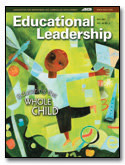Listen in. Marge Scherer, EL’s Editor in Chief, reads her May 2007 Perspectives column “Why Focus on the Whole Child?” in this bonus MP3.
“The best way to achieve academic achievement is to focus on academic achievement.”
“You don't need to focus on the whole child. You need to teach him how to read.”
“Is there another way to measure success besides test scores? I'm sure it is something squishy and subjective. And useless.”
These hostile words from the blogosphere echo as I begin to write about why ASCD embraces a campaign called “education for the whole child.” A topic that speaks to many educators' hearts because they see it as the reason they entered the profession, education for the whole child can be misunderstood by school critics as anti-accountability, anti-testing, and even, it seems, anti-reading. It's none of those things. This issue of Educational Leadershipurges educators to reclaim the idea that we teach, yes, skills and subjects, but, above all, children.
First reclaim the curriculum. Back when Thomas Jefferson's library shelves held the world's core knowledge, those who wanted to educate the young elite did not list reading and basic math as the only subjects worth learning. They set forth a long list of challenging goals for public education. Among them, as Richard Rothstein and colleagues (p. 8) write, were to inform citizens, to enable them to know their rights, and to teach them to conduct their social relations with intelligence and heart. Today's parents—no matter their economic class—want a lot more than the basic skills for their children, too. They want a challenging curriculum, critical thinking, social skills, citizenship, health, the arts, and preparation for skilled employment.
At a recent symposium, participants noted that schools are stealing time from history, the arts, and recess to devote more instructional time to tested subjects. Diane Ravitch, who espouses a core curriculum, spoke eloquently:Education must aim for far more than mastery of the basics, far more than the possession of tools for economic competitiveness. Certainly it should aim for enough (content) for an examined life, enough for civic virtue, and enough for those mental habits that incline one to think, to read, to listen, to discuss, to feel just a bit uncertain about one's opinions, and to love learning. (Education Week, Jan. 30, 2007)
Marion Brady, an opponent of traditional curriculum, interestingly expresses a similar idea. He writes:We've created a way of life that makes specialized studies indispensable. But assuming that the core fields are pretty much the whole story has also cost much, and the costs are escalating. School finally isn't about disciplines and subjects, but about what they were originally meant to do—help the young make more sense of life, more sense of experience, more sense of an unknowable future. (Education Week, Aug. 30, 2006)
Next, reclaim instruction. Emily Dickinson wrote, “Tell all the truth, but tell it slant. Success in circuit lies.” Anyone who has ever taught knows that “telling it doesn't mean teaching it.” To engage students in learning, a master teacher must, as Carol Ann Tomlinson and Amy Germundson write (p. 27), do something like create jazz: One must borrow from many traditions to compose the melody line, blend surprise and improvisation, and, most important, connect with those for whom one is performing. “It is virtually impossible to make things relevant for or expect personal excellence from a student you don't know,” they write. “The teacher must find some way to move the student with the music.”
Reclaim assessment. Historically, a major role of assessment has been to rank students. Today despite claims to raise every student to proficiency, tests still create winners and losers. How to reclaim assessment as an educative process is Rick Stiggins's focus. (p. 22). He writes:When we use assessment for learning, assessment becomes far more than merely a onetime event stuck onto the end of an instruction unit. It becomes a series of interlaced experiences that enhance the learning process by keeping students confident and focused on their progress, even in the face of occasional setbacks. . . . Even the most valid and reliable assessment cannot be regarded as high quality if it causes a student to give up.
Reclaim kids. The teenagers in the studyThe Silent Epidemic told researchers that the main reason they dropped out of school was boredom with classes. Other reasons were that they missed too many days and could not catch up, that their friends were not interested in school, and that they were failing. Seventy-one percent indicated that they started becoming disinterested in high school as early as 9th and 10th grade.
ASCD's whole child campaign is a way of stopping the waste of too much talent and the loss of too many kids. That loss of potential is the hard reality against which educators do battle every day. Squishy? Subjective? Far from it.


